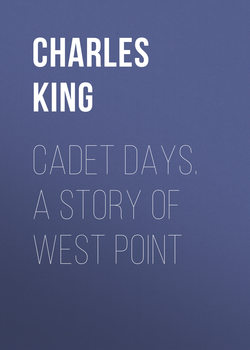Читать книгу Cadet Days. A Story of West Point - King Charles, Various - Страница 5
CHAPTER V
ОглавлениеThe dusk of evening had fallen on the Point when the battalion broke ranks, returning from supper. A few minutes later, a hundred strong, came the column of plebes, marching by fours, looking even more than usually sombre now in their suits of gray, contrasting with the white trousers and natty bell-buttoned coatees of the corps, and feeling, doubtless, more than usually solemn in anticipation of the possible experiences ahead of them. First night of plebe camp is a thing not soon to be forgotten, even in these days when pitchy darkness no longer shrouds the pranks of the yearlings, and official vigilance and protection have replaced what really seemed tacit encouragement and consent of over thirty years ago. Then it was no uncommon thing for the new cadet to be dragged out ("yanked," was the expression in vogue) and slid around camp on his dust-covered blanket twenty times a night, dumped into Fort Clinton ditch, tossed in a tent-fly, half smothered in the folds of his canvas home, tumbled by his tormentors about his ears, ridden on a tent pole or in a rickety wheelbarrow, smoked out by some vile, slow-burning pyrotechnic compound, robbed of rest and sleep, at the very least, after he had been alternately drilled and worked all the livelong day. Verily, the hardening process of the early sixties was a thing that might well be frowned down upon and stamped out, but it took stringent measures to effect it. In great measure the deviling system was, so far as its most harmful features were concerned, but the ghost of its old self when Ralph McCrea entered the Academy just after the Centennial year. Then little by little means were taken to make the process still more difficult to the perpetrators, until twenty years after the War of the Rebellion hazing became indeed hazardous. Officers were kept on duty and on the alert in camp at all hours. Gas-lamps were placed along the sentry post. In every way the authorities could foresee the plebe was protected from the more active torment of the old days. But so long as boys will be boys some modification must exist; and as for the year of probation which the new-comer must pass – the year in which he is taught in every conceivable way that he is a creature far apart from the rest of the corps, a being to be drilled, trained, disciplined, badgered, even at times bullied – it is really a year of most valuable experiences, perhaps the most valuable of the four. It is this that teaches him that no matter what may be the wealth or social standing of his relatives, he is no better than the humblest clodhopper of his class. It is this year that teaches him to look to his own class-mates and no others for comrades and chums. It is this that teaches him silence, patience, and fortitude. Nine out of ten of the plebes and their relatives pronounce it inhuman and barbarous so long as it applies to them or theirs. Ninety-nine out of a hundred, however, uphold it so soon as their plebehood is done.
